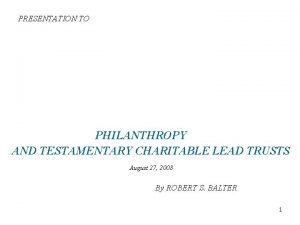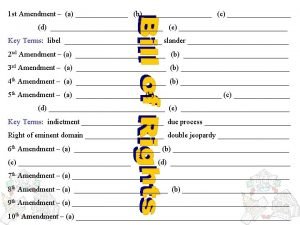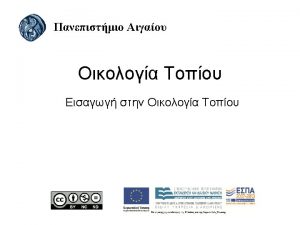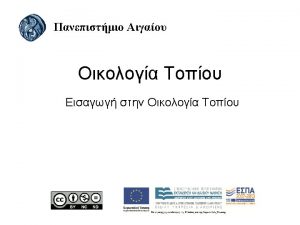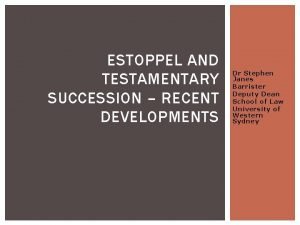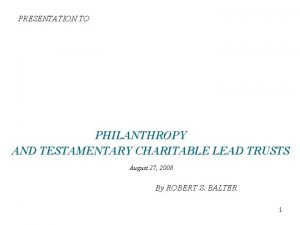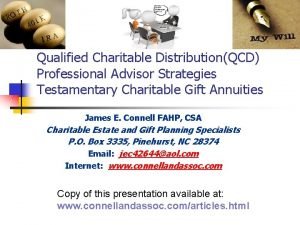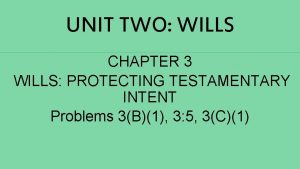TESTAMENTARY FREEDOM in the 2018 landscape challenges and









![Raymond Allen James v Karen James & Others [2018]. • A will was prepared Raymond Allen James v Karen James & Others [2018]. • A will was prepared](https://slidetodoc.com/presentation_image_h2/91cd6af4deb2ddb7b0044a66b6f3b453/image-10.jpg)


![Edwards v Edwards and Another [2007]. • The deceased made a will leaving her Edwards v Edwards and Another [2007]. • The deceased made a will leaving her](https://slidetodoc.com/presentation_image_h2/91cd6af4deb2ddb7b0044a66b6f3b453/image-13.jpg)
![Hubbard v Scott [2011]. • In the case of Hubbard v Scott [2011] the Hubbard v Scott [2011]. • In the case of Hubbard v Scott [2011] the](https://slidetodoc.com/presentation_image_h2/91cd6af4deb2ddb7b0044a66b6f3b453/image-14.jpg)


![Burns v Burns [2016] EWCA Civ 37. • Dispute between two sons over which Burns v Burns [2016] EWCA Civ 37. • Dispute between two sons over which](https://slidetodoc.com/presentation_image_h2/91cd6af4deb2ddb7b0044a66b6f3b453/image-17.jpg)



![Harcourt – The Public Guardian v A [2013] Coplr 69 Pre Death. • Donor Harcourt – The Public Guardian v A [2013] Coplr 69 Pre Death. • Donor](https://slidetodoc.com/presentation_image_h2/91cd6af4deb2ddb7b0044a66b6f3b453/image-21.jpg)
![TJC, R v [2015] Ewca Crim 1276 Post Death. • On showing signs of TJC, R v [2015] Ewca Crim 1276 Post Death. • On showing signs of](https://slidetodoc.com/presentation_image_h2/91cd6af4deb2ddb7b0044a66b6f3b453/image-22.jpg)





![The maintenance standard – case law. • Re Dennis (Deceased) [1981] 2 ALL ER The maintenance standard – case law. • Re Dennis (Deceased) [1981] 2 ALL ER](https://slidetodoc.com/presentation_image_h2/91cd6af4deb2ddb7b0044a66b6f3b453/image-28.jpg)


![Thompson v Raggett [2018] EWHC 688 (Ch). • The claimant had lived with the Thompson v Raggett [2018] EWHC 688 (Ch). • The claimant had lived with the](https://slidetodoc.com/presentation_image_h2/91cd6af4deb2ddb7b0044a66b6f3b453/image-31.jpg)







![General rule – there is no property in body. • Williams v Williams [1880] General rule – there is no property in body. • Williams v Williams [1880]](https://slidetodoc.com/presentation_image_h2/91cd6af4deb2ddb7b0044a66b6f3b453/image-39.jpg)



![Fessi v Whitmore [1999] 1 FLR 767. • The deceased was a 12 year Fessi v Whitmore [1999] 1 FLR 767. • The deceased was a 12 year](https://slidetodoc.com/presentation_image_h2/91cd6af4deb2ddb7b0044a66b6f3b453/image-43.jpg)
![Re JS (Disposal Of Body) [2016] EWHC 2859 (FAM). • A 14 year old Re JS (Disposal Of Body) [2016] EWHC 2859 (FAM). • A 14 year old](https://slidetodoc.com/presentation_image_h2/91cd6af4deb2ddb7b0044a66b6f3b453/image-44.jpg)



- Slides: 47


“TESTAMENTARY FREEDOM in the 2018 landscape. . . challenges and disputes pre and post death”. Thursday 18 October 2018

Meet the team. Wills, trusts and probate. Wendy John Partner DDI: 01642 636510 Email: wendy. john@archerslaw. co. uk Irene Cox Associate Solicitor DDI: 01642 636560 Email: irene. cox@archerslaw. co. uk Katie Wigham Solicitor DDI: 01642 636553 Email: katie. wigham@archerslaw. co. uk Leah Duffield Solicitor DDI: 01642 636548 Email: leah. duffield@archerslaw. co. uk Wendy Grainger Legal Assistant DDI: 01642 636572 Email: wendy. grainger@archerslaw. co. uk Helen Brown Solicitor DDI: 01642 636519 Email: helen. brown@archerslaw. co. uk Mary Foster Trainee Solicitor DDI: 01642 636 562 Email: mary. foster@archerslaw. co. uk Disclaimer: The information in these slides is not legal advice. The application and impact of laws can vary widely based on the specific facts involved. As such, the information should not be used as a substitute for consultation or instruction with a professional legal advisor or other competent advisers on such matters. Before making any decision or taking any action on such matters, you should consult a legal advisor. Archers Law LLP, its Members and employees do not accept any liability for any damages or losses whatsoever, arising out of, or in any way related to, the use of this site We are happy to assist. Jack Reynolds Legal Assistant DDI: 01642 636593 Email: jack. reynolds@archerslaw. co. uk

Meet the team. Litigation. Kenton Bazeley Partner DDI: 01642 636516 Email: leah. duffield@archerslaw. co. uk Helen Lyne Associate Solicitor DDI: 01642 636538 Email: helen. lyne@archerslaw. co. uk Angela Torrance Partner DDI: 01642 636537 Email: angela. torrance@archerslaw. co. uk Ellie Clements Trainee Solicitor DDI: 01642 636536 Email: ellie. clements@archerslaw. co. uk Richard Flounders Associate Solicitor DDI: 01642 636547 Email: richard. flounders@archerslaw. co. uk

Introduction. Why are we seeing an increase in disputes? • Many more second and third marriages now, resulting in blended families. • Estranged adult children, often living in different parts of the UK/World. • The average person has much more to fight over now! • A more litigious society, possibly partly due to varied routes of access to legal services as well as increased social media coverage of cases. • People living longer with more challenging health conditions including dementia/ Alzheimer's. • What can clients do to protect themselves/their estates from claims, or deal with claims when they do arise?

Testamentary capacity – Banks v Goodfellow (1870). A testator must: • Understand the nature of making a will and its effects (sound mind). • Understand the extent of the property of which he is disposing (sound memory). • Be able to comprehend appreciate the claims to which he ought to give effect (sound understanding). • Have no disorder of the mind that perverts his sense of right or prevents the exercise of his natural faculties in disposing of his property by will.

Facts of Banks v Goodfellow (1870). • Mr Banks had mental health problems and had spent several years in a mental health institute. He believed that he was being persecuted by a man called Featherstone Alexander. • In his will he left his estate to his niece. His niece died two years later at the age of 20. • His niece died intestate and her estate went to one of her relatives was no relative of Mr Banks. • Mr Banks’ will was challenged by one of his relatives on the basis that he lacked testamentary capacity. • Held, the will was valid. Mr Banks had suffered from mental illness but his delusions did not affect his decisions to make gifts under his will.

Time for assessing capacity. • Generally testamentary capacity is relevant at the time when the will is signed and witnessed. • If the testator loses capacity after the will has been executed the will remains valid. • Case law suggests that a will may be valid even if the testator lacked capacity when the will was executed PROVIDED THAT the testator had capacity when the instructions were given and that at the time of execution the testator remembers giving those instructions and believes that the will has been drafted in accordance with those instructions (Parker v Felgate (1883).

Assessing capacity in practice. We; • ask questions to assess whether or not the testator understands when their wishes will take effect (i. e. , on death); • request details of the testator's assets; • seek an overview of the testator's family and ask for reasons behind any unusual or unexpected gifts; • ask about the testator's state of health and, where appropriate, any medication they may be taking; • take very detailed attendance notes of the meetings with the testator, including a detailed assessment in line with the Banks v Goodfellow test where necessary • Consider the “golden rule” where applicable
![Raymond Allen James v Karen James Others 2018 A will was prepared Raymond Allen James v Karen James & Others [2018]. • A will was prepared](https://slidetodoc.com/presentation_image_h2/91cd6af4deb2ddb7b0044a66b6f3b453/image-10.jpg)
Raymond Allen James v Karen James & Others [2018]. • A will was prepared for the testator in May 2010. The will was signed in September 2010. • In May 2011 medical professionals said that the testator did not have “the basic capacity to make decisions about his health care, where he lives or his finances”. • The testator did not make any provision for his son in the will and his son made a claim that the testator lacked testamentary capacity when the will was signed. • It was held that the will was valid. In making the decision the judge weighed up the facts of the case and the earlier gifts that the testator had made in his lifetime to his son. It did not matter that the solicitor had not obtained a medical report as this is only good practice not law.

Lloyd v Jones (2016). • Testatrix had a daughter and a son. She left her daughter £ 10, 000 and her son the residue of the estate worth approx. £ 600, 000. • The daughter made a claim that the will was invalid because the testatrix lacked testamentary capacity. • Evidence was produced that 5 months after the will was signed the deceased was suffering from dementia, glaucoma and that she had suffered memory loss for the previous two years and that she heard voices and suffered delusions. • It was held that the will was valid. The deceased did suffer from dementia at the time the will was signed but that did not necessarily mean that she lacked capacity in line with Banks v Goodfellow.

Undue Influence. • Undue influence is where the testator or testatrix is coerced into making a will that they otherwise would not have made. • For a will to be successfully challenged on the grounds of undue influence there needs to be more than merely persuasion or dropping hints. • Wingrove v Wingrove [1886] – testator may be led but not driven, the will must be of his own making. • It is up to the individual challenging the will to show that there was no other reason for leaving the estate as it is other than as a result of coercion.
![Edwards v Edwards and Another 2007 The deceased made a will leaving her Edwards v Edwards and Another [2007]. • The deceased made a will leaving her](https://slidetodoc.com/presentation_image_h2/91cd6af4deb2ddb7b0044a66b6f3b453/image-13.jpg)
Edwards v Edwards and Another [2007]. • The deceased made a will leaving her estate to her three sons in equal shares. • Shortly before her death the testatrix made a new will leaving her estate to only one of her sons. He was an abusive alcoholic and the testatrix did not have a good relationship with him. • It was held that the new will was invalid and the previous will stood. This was a case involving undue influence because there was ‘no other reasonable explanation’.
![Hubbard v Scott 2011 In the case of Hubbard v Scott 2011 the Hubbard v Scott [2011]. • In the case of Hubbard v Scott [2011] the](https://slidetodoc.com/presentation_image_h2/91cd6af4deb2ddb7b0044a66b6f3b453/image-14.jpg)
Hubbard v Scott [2011]. • In the case of Hubbard v Scott [2011] the deceased (Albert) had no children and was a widow. His will left his estate to his friend’s two daughters. • In 2006 Mrs Kruk began cleaning for him. In 2009 Albert made a new will in favour of Mrs Kruk. At the time of the new will instructions Albert, Mrs Kruk and her friend were present. Albert made a joke about marrying Mrs Kruk. • It was held that the will was valid. In order to successfully prove undue influence the individual challenging the will needs to show that the testator was unable to exercise their own judgement.

Avoiding undue influence in practice. • Never take will instructions without having seen the testator alone at some point. • Document which aspects of the meeting were in the presence of another and at which stage(s) that person left the room. • Decline to act if faced with strong resistance to this from the third party?

Challenge to testamentary capacity. • Presumption of Capacity. • If a will is rational on its face, properly executed and attested, in the absence of evidence to the contrary - presumed it is made by person of competent understanding. • If issue of testamentary capacity is raised, the burden of proof remains with those seeking to prove the will. To challenge: • Require evidence to counter balance their presumption of capacity • Allegations relating to testamentary capacity must be pleaded specifically and particulars of facts and matters relied upon must be given (CPR 57. 7. 4) • Larke v Nugus Request • Testator’s medical records • Witness evidence of friends/family/neighbours • Strong evidence required to challenge a Solicitor’s view of testamentary capacity (Hawes v Burgess [2013] and another [2013] EWCA Civ 74, Court of Appeal)
![Burns v Burns 2016 EWCA Civ 37 Dispute between two sons over which Burns v Burns [2016] EWCA Civ 37. • Dispute between two sons over which](https://slidetodoc.com/presentation_image_h2/91cd6af4deb2ddb7b0044a66b6f3b453/image-17.jpg)
Burns v Burns [2016] EWCA Civ 37. • Dispute between two sons over which of two wills prevails. • Challenges to capacity and knowledge and approval of later will. • Solicitor who drafted the will did not follow the “golden rule”; short notes on the file. • Some medical evidence of dementia, poor short term memory; problems with analysis. • The will was upheld. • NB: There was a 50/50 share for the two sons in the will.

Allegations of undue influence. • Where the validity of a will is challenged as a result of some undue influence, the burden shifts onto the person making the allegation. • Allegations of undue influence “ought never to be put unless the party who pleads it has reasonable grounds upon which to support it”. (Spiers v English [1907]) • Allegations must be pleaded specifically and particulars of the facts and matters relied upon must be given (CPR 57. 7. 4). Costs – Be warned! If found not to have reasonable grounds to support allegations of undue influence, there is a real risk the unsuccessful party will be ordered to pay costs of the whole action.

Edkins v Hopkins. • Shortly before his death the testator has spent time in hospital because he was suffering from alcoholic liver damage. • He discharged himself from hospital and 10 days later signed his will. • The will left most of his estate to his friend and business partner, Mr Edkins. • The Testator’s wife and 3 sons claimed that Mr Edkins had put undue influence on the Testator and that the Testator had been in a vulnerable state. • It was held the will was valid. • The Judge took into account the long friendship and business connections that the deceased had with the main beneficiary. • Despite the poor mental health which the deceased suffered from at times as a result of his alcoholism, it was a “step too far” to hold that Mr Edkins had asserted undue influence on the deceased.

Challenges to Attorneyship. • Number of different Powers of Attorney, today focusing on Lasting Powers of Attorney. • Any decision made by an Attorney must be in the Donor’s best interest. [Section 1(5) Mental Capacity Act 2005]. • MCA Code of Practice sets out duties of Attorneys – No conflict; – No profit; – Duty not to delegate; – Duty of good faith. • Concerns during Donor’s lifetime report to Office of Public Guardian “(OPG”). • Litigation tactics – Where issues come to light post death, investigate the estate (including possibly a Forensic Accountant’s Report); – Report issues to the DWP and the Police (e. g. fraudulently signed cheques); – Threat of local press interest, if it proceeds to Court.
![Harcourt The Public Guardian v A 2013 Coplr 69 Pre Death Donor Harcourt – The Public Guardian v A [2013] Coplr 69 Pre Death. • Donor](https://slidetodoc.com/presentation_image_h2/91cd6af4deb2ddb7b0044a66b6f3b453/image-21.jpg)
Harcourt – The Public Guardian v A [2013] Coplr 69 Pre Death. • Donor appointed her daughter as her Attorney under an LPA. • The daughter made frequent unaccounted for cash withdrawals, she did not pay the care home fees and did not ensure that her mother had enough pocket money. • The donor did not have capacity to revoke the LPA or monitor her Attorney’s financial management • The Judge revoked the LPA. The daughter had not behaved in the best interests of her mother.
![TJC R v 2015 Ewca Crim 1276 Post Death On showing signs of TJC, R v [2015] Ewca Crim 1276 Post Death. • On showing signs of](https://slidetodoc.com/presentation_image_h2/91cd6af4deb2ddb7b0044a66b6f3b453/image-22.jpg)
TJC, R v [2015] Ewca Crim 1276 Post Death. • On showing signs of dementia, a father appointed his daughter as his Attorney in 2010, with his son a substitute. • After being appointed as Attorney, the daughter moved her father into her home and her daughter and her friends moved into her father’s house. After a year, her father moved into a care home. • The son saw one of the bank statements and became concerned and contacted the Office of the Public Guardian “(OPG)”. • The OPG discovered that significant sums of money totalling £ 75, 000 had been withdrawn from the father’s bank account and in some cases transferred to her own. • The outcome as that the daughter had clearly acted dishonestly and the overall sums of money spent were greater than what would have been required to care for the deceased.

The Inheritance (Provision For Family & Dependants) Act 1975 Claims. • Not just headlines in the Daily Mail. • Explosion of this type of litigation.

The status of the applicant. The court will consider the applicant’s relationship with the deceased, namely whether: • A spouse or civil partner; • A cohabitee who has been living with the deceased for a period of two years immediately before their death as husband wife or civil partner; • A former spouse or civil partner who has not subsequently married or entered into another civil partnership; • A child of the deceased; • Any person whom the deceased treat as a child in relation to any marriage or civil partnership; and • Any person, who was either being wholly or partly maintained by the deceased immediately before their death.

The applicable standards. There are two standards which can apply to an applicant depending on their relationship with the deceased, these are: • Reasonable financial provision; and • The maintenance standard

Reasonable financial provision. • This standard applies to claimants who are the spouse of the deceased, civil partner or treated as a spouse or civil partner whilst cohabiting for the two years prior to the death. • The court will consider what was reasonable for the deceased to leave under a will or intestacy. • This standard attracts a higher figure when the courts are considering what was reasonable as it goes above what is needed for the claimant’s maintenance. • It is often compared to what the claimant would be entitled to if the spouse or civil partnership ended whilst the deceased was still alive.

The maintenance standard. • For any other applicant, such as children (and those treated as such) and any person being maintained, the ‘maintenance standard’ will apply. • When this standard applies, the court will consider what is reasonable for the claimant to receive for their maintenance only. • This is a lower standard than the ‘reasonable financial provision’ standard that applies to spouses, civil partners and co-habitants. • The Inheritance Act does not state what is meant by maintenance but case law has provided guidance on what will be considered reasonable.
![The maintenance standard case law Re Dennis Deceased 1981 2 ALL ER The maintenance standard – case law. • Re Dennis (Deceased) [1981] 2 ALL ER](https://slidetodoc.com/presentation_image_h2/91cd6af4deb2ddb7b0044a66b6f3b453/image-28.jpg)
The maintenance standard – case law. • Re Dennis (Deceased) [1981] 2 ALL ER 140 – Suggested that maintenance meant the provision needed to discharge the cost of daily living at whatever standard of living is appropriate to the claimant. • Ilott v The Blue Cross [2017] UKSC 17 – The distinction between the reasonable financial provision standard and the maintenance standard means it cannot be whatever the claimant deems desirable.

The section 3 factors. The Court will have regard to the factors set out in section 3 of the Inheritance Act when considering what a reasonable financial provision to leave to the claimant was. These factors are: a. The financial resources and financial needs which the Applicant has or is likely to have in the foreseeable future; b. The financial resources and financial needs which any other applicant has or is likely to have in the foreseeable future; c. Financial Resources and financial needs which any beneficiary of the estate of the deceased has or is likely to have in the foreseeable future d. Any obligations and responsibilities which the deceased had towards any applicant or towards any beneficiary of the estate of the deceased; e. The size and nature of the net estate of the deceased; f. Any physical or mental disability of any applicant or any beneficiary of the estate; g. Any other matter including the conduct of the applicant or any other person, which in the circumstances of the case the Court may consider relevant.

Cohabitees. • Courts have more recently taken a broad approach to what degree of cohabitation is necessary. Kaur v Dhaliwal [2014] EWHC 1991 (L). • The Claimant qualified to make a claim, although the period of cohabitation was less than two years (1 year and 49 weeks). Martin v Williams [2017] EWHC 491 (Ch) • Claim by cohabitee of the deceased. • The deceased separated from his wife many years earlier but never divorced. • The deceased did not update his will and his entire estate was left to his estranged wife, leaving nothing to his cohabitee partner. • The cohabitee was awarded a life interest in the deceased’s share of their jointly owned property.
![Thompson v Raggett 2018 EWHC 688 Ch The claimant had lived with the Thompson v Raggett [2018] EWHC 688 (Ch). • The claimant had lived with the](https://slidetodoc.com/presentation_image_h2/91cd6af4deb2ddb7b0044a66b6f3b453/image-31.jpg)
Thompson v Raggett [2018] EWHC 688 (Ch). • The claimant had lived with the deceased for 42 years prior to his death. • The deceased did not leave anything for the Claimant in his will, but instead left his £ 1. 5 m estate to Carla Evans and Agon Berisha who were tenants of one of his properties. • The deceased had created a letter of wishes explaining his reasons for excluding Joan from the will. These were that he did not trust the Claimant’s children. It was held it was unreasonable for the Claimant to move out of her home where she lived for the last 42 years. • The Claimant was elderly and in need of care which will be provided by her son and his wife therefore it made sense for there to be an outright transfer of the house rather than a life interest. • A lump sum for renovating and moving into the property was also awarded and a lump sum for the future maintenance.

Adult children. • You cannot shut off a claim by an adult child simply because the claimant is able bodied. • A claim by an adult child should be assessed likely any other claim, by considering fully and properly all the relevant section 3 factors. Ilott v Mitson [2017] UKSC 17 • The deceased died leaving a will and stated expressly that she did not want her daughter Mrs Illott to receive anything. • The deceased left her estate valued at £ 486, 000 to three animal charities to which she had no connection. • At first instance the Judge awarded Mrs Illott a lump sum of £ 50, 000. However Mrs Illiott argued that this deprived her of her means tested benefit. • The Court of Appeal awarded Mrs Illott £ 143, 000 to allow her to buy a home together with £ 20, 000 additional income. • The Supreme Court reinstated the first instance decision. The Supreme Court said that “claims brought under the Inheritance Act should be limited to the provision of maintenance and that they cannot extend to any and everything which is desirable for the Claimant to have. ” • Quantum in adult cases is difficult, there is a pattern in recent cases awarding around 10% of the net estate (not a rule each case will turn on its own facts).

Short time for making Inheritance Act claims. • The Claim Form (i. e. the court proceedings) must be issued within six months from the date of the Grant of Representation section 4 of the Inheritance Act. • If outside the 6 month time limit the claimant will need permission of the court to proceed.

Procedural points. • Pre-action protocol letter of claim is of critical importance in Inheritance Act claims. • It must set out all relevant section 3 factors. • The claimant should provide an indication of the desired amount and the manner in which the award should be made. • If the defendant beneficiaries do not reveal their means, this will lead to the natural inference, that they are well off and cannot mount a needs based defence. • Practitioners are advised to adhere to the Association of Contentious Trust and Practitioners ACTAPS Practice Guidance for the resolution of Probate Trust disputes the ACTAPS code.

Mediation. • Inheritance Act claims are very suitable for Mediation. • Refusal to engage in Mediation requires a very convincing explanation, to avoid cost consequences.

Types of awards. Upon deciding that a reasonable financial provision on either standard has not been made the court can make the following Orders: a. A capital lump sum payment to the applicant; b. Periodical payments; c. An Order to transfer property in the estate to the applicant; d. An Order for acquisition of the property out of the estate funds; e. Variation of post-nuptial settlements; f. Trusts for bereaved minors; and g. Life Interest Trusts.

What about the testator's wishes? • The testator cannot directly exclude the court’s jurisdiction under the Inheritance Act. • However, testator’s wishes may be relevant to section 3 factors (Section 3(1)(g) which provide that the court must have regard to any other matter, including the conduct of the applicant and others. • The court will consider statements as to why provision is not made and why provision is made for those who benefit • Testator can consider some kind of “middle ground” when drafting the will and planning distribution of estate, for example, rights of occupation, life interests, insurance policies, forfeiture clauses.

Possession of a deceased body: rights and responsibilities. • Disputes over a loved ones remains are a growing trend. • Disputes over funeral arrangements highlight the importance of having a will, because a will can set out the funeral wishes of the testator. • When responsibility for disposal of the body is challenged, the law provides that an Executor gets his/her authority from the Will and therefore has authority immediately on death. However, where a person dies intestate, legally they get their responsibility from the Grant of Letters of Administration which can take some time to obtain. • Clients should always consider pre-paid funeral arrangements where they envisage disputes post death.
![General rule there is no property in body Williams v Williams 1880 General rule – there is no property in body. • Williams v Williams [1880]](https://slidetodoc.com/presentation_image_h2/91cd6af4deb2ddb7b0044a66b6f3b453/image-39.jpg)
General rule – there is no property in body. • Williams v Williams [1880] 20 Ch D 659 • Dobson v North Tyneside Health Authority [1996]EWCA Civ 1301 • The deceased body cannot form part of his estate and the beneficiaries cannot claim any rights over the body. Possession of the body • A person who is responsible for disposing of the body has the right of possession for the purpose of disposing of it • The Coroner has the right to possession of a body if an inquest is required

Responsibility for disposing of the body. • The following persons are responsible for disposing of the body. The Personal Representative The parents of a deceased child A household in which the body lies (including Hospital Authority) The local authority for the area in which the body was found (if no other arrangements are made) • The next of kin does not have a right or a responsibility to dispose of the deceased’s body Concerns for executors They are not bound to follow the deceased’s wishes.

Conflicts regarding the body. • A Court’s overriding concern is that the body is disposed of with proper respect and dignity. • In Hartshorne v Gardner [2008] EWCH B 3 (Ch), the Court considered the following factors: – – The deceased's wishes; The wishes of the family and friends; The place the deceased was most closely connected to; Practicalities.

Cremation. • The Cremation (England Wales) Regulations 2008. • Regulation 15 provides an Application for cremation may be made by an Executor or near relative who is aged over 16, including widows, widowers, civil partners, parents, children and other relatives. • Under Regulation 30, the Cremation Authority must give the ashes to the Applicant or person nominated by the Applicant. • Real potential for conflict on this point - does the Applicant have priority over an Executor over possession of the deceased's ashes? (Yet to be tested in an English and Welsh Court).
![Fessi v Whitmore 1999 1 FLR 767 The deceased was a 12 year Fessi v Whitmore [1999] 1 FLR 767. • The deceased was a 12 year](https://slidetodoc.com/presentation_image_h2/91cd6af4deb2ddb7b0044a66b6f3b453/image-43.jpg)
Fessi v Whitmore [1999] 1 FLR 767. • The deceased was a 12 year old boy who died in an accident shortly after moving to a new home in Wales with his father. • His mother wanted his ashes to be scatted where they had lived together as a family and where his grandparent’s ashes had been scattered. • His father wanted the ashes to be buried near to his new home. • The Judge found that he had a discretion to decide the dispute. • The mother’s argument won. • The Judge said that “taking everything into account, it seemed a place where all members of the family could come together to see a fitting memorial to the child’s life”.
![Re JS Disposal Of Body 2016 EWHC 2859 FAM A 14 year old Re JS (Disposal Of Body) [2016] EWHC 2859 (FAM). • A 14 year old](https://slidetodoc.com/presentation_image_h2/91cd6af4deb2ddb7b0044a66b6f3b453/image-44.jpg)
Re JS (Disposal Of Body) [2016] EWHC 2859 (FAM). • A 14 year old girl was suffering from a rare form of cancer and was receiving palliative care, she wanted her body to be frozen in the hope that she might be able to be brought back to life in years to come, when a cure for her illness might have been found. • The child’s parents were divorced and the child had not had face to face contact with her father for 8 years. Her father was not entirely in agreement with the proposal. • The Court decided to make a specific Order permitting the mother to continue to make arrangements during the child’s lifetime for the preservation of her body after death. • An Injunction prevented the father interfering with arrangements made by the mother. • A prospective Order to take effect upon the child’s death appointing the mother as the sole administrator of her estate and specifically that the mother shall have the right to make arrangements for the disposal of the body and to decide who should be permitted to view it.

Practice And procedure for disputes. • Lodge a Standing Search at Probate Registry (£ 10) - To see the will once a Grant of Probate has been taken out; • File a Caveat at Probate Registry (£ 20) to stop a grant of probate being taken out; • Larke v Nugus Request - will preparation file of papers; • Deceased’s medical records; • Without Prejudice letters; • Pre action protocol Letter of Claims; • Unfair Prejudice Claims – minority shareholders – family company; • Part 36 offers to settle; • ADR/Mediation; • Funding - CFA - No win / no fee;

Costs. • In probate actions at the discretion of the Court. • General rule - costs follow the event. • Except where the litigation has been caused by the conduct of the Testator or conduct of the principle beneficiary or where circumstances afford reasonable grounds for investigation into the validity of a will.

“You can choose your friends but not your family!”
 Testamentary charitable lead trust
Testamentary charitable lead trust Non-testamentary instrument meaning
Non-testamentary instrument meaning Positive freedom negative freedom
Positive freedom negative freedom Glorious freedom wonderful freedom
Glorious freedom wonderful freedom B a f c j e
B a f c j e Hình ảnh bộ gõ cơ thể búng tay
Hình ảnh bộ gõ cơ thể búng tay Frameset trong html5
Frameset trong html5 Bổ thể
Bổ thể Tỉ lệ cơ thể trẻ em
Tỉ lệ cơ thể trẻ em Chó sói
Chó sói Chụp phim tư thế worms-breton
Chụp phim tư thế worms-breton Hát lên người ơi alleluia
Hát lên người ơi alleluia Các môn thể thao bắt đầu bằng tiếng nhảy
Các môn thể thao bắt đầu bằng tiếng nhảy Thế nào là hệ số cao nhất
Thế nào là hệ số cao nhất Các châu lục và đại dương trên thế giới
Các châu lục và đại dương trên thế giới Cong thức tính động năng
Cong thức tính động năng Trời xanh đây là của chúng ta thể thơ
Trời xanh đây là của chúng ta thể thơ Mật thư anh em như thể tay chân
Mật thư anh em như thể tay chân Làm thế nào để 102-1=99
Làm thế nào để 102-1=99 độ dài liên kết
độ dài liên kết Các châu lục và đại dương trên thế giới
Các châu lục và đại dương trên thế giới Thơ thất ngôn tứ tuyệt đường luật
Thơ thất ngôn tứ tuyệt đường luật Quá trình desamine hóa có thể tạo ra
Quá trình desamine hóa có thể tạo ra Một số thể thơ truyền thống
Một số thể thơ truyền thống Cái miệng nó xinh thế
Cái miệng nó xinh thế Vẽ hình chiếu vuông góc của vật thể sau
Vẽ hình chiếu vuông góc của vật thể sau Nguyên nhân của sự mỏi cơ sinh 8
Nguyên nhân của sự mỏi cơ sinh 8 đặc điểm cơ thể của người tối cổ
đặc điểm cơ thể của người tối cổ Giọng cùng tên là
Giọng cùng tên là Vẽ hình chiếu đứng bằng cạnh của vật thể
Vẽ hình chiếu đứng bằng cạnh của vật thể Tia chieu sa te
Tia chieu sa te Thẻ vin
Thẻ vin đại từ thay thế
đại từ thay thế điện thế nghỉ
điện thế nghỉ Tư thế ngồi viết
Tư thế ngồi viết Diễn thế sinh thái là
Diễn thế sinh thái là Dot
Dot Các số nguyên tố là gì
Các số nguyên tố là gì Tư thế ngồi viết
Tư thế ngồi viết Lời thề hippocrates
Lời thề hippocrates Thiếu nhi thế giới liên hoan
Thiếu nhi thế giới liên hoan ưu thế lai là gì
ưu thế lai là gì Hổ đẻ mỗi lứa mấy con
Hổ đẻ mỗi lứa mấy con Sự nuôi và dạy con của hươu
Sự nuôi và dạy con của hươu Sơ đồ cơ thể người
Sơ đồ cơ thể người Từ ngữ thể hiện lòng nhân hậu
Từ ngữ thể hiện lòng nhân hậu Thế nào là mạng điện lắp đặt kiểu nổi
Thế nào là mạng điện lắp đặt kiểu nổi Landscape development and environmental changes
Landscape development and environmental changes
